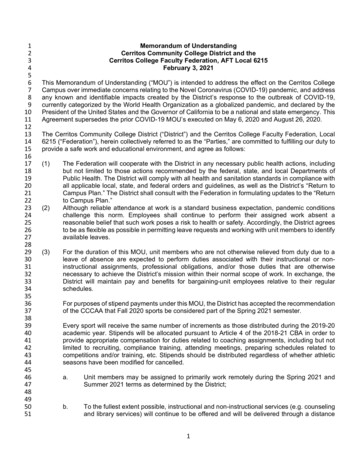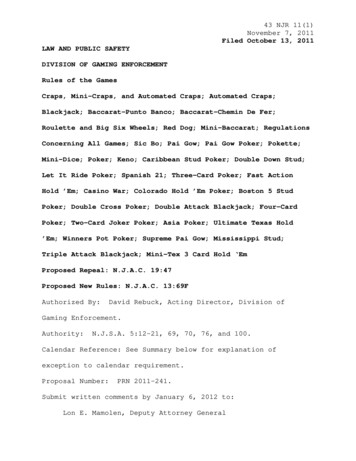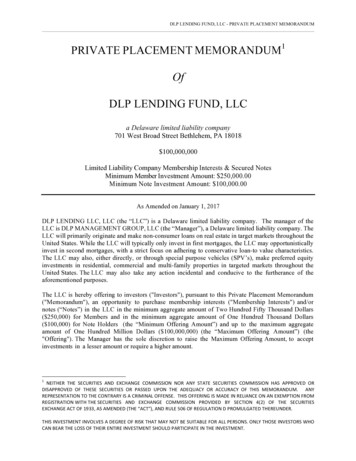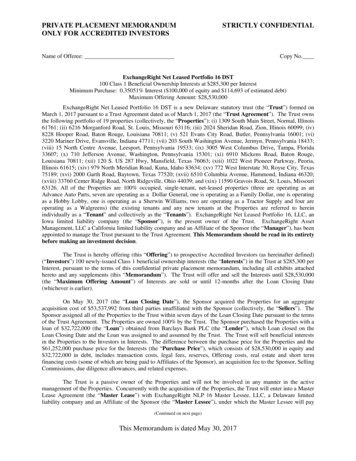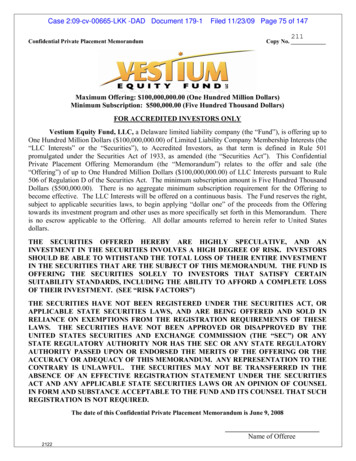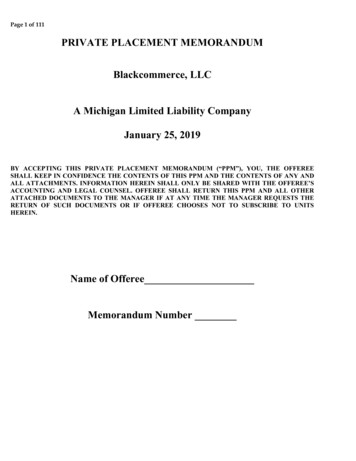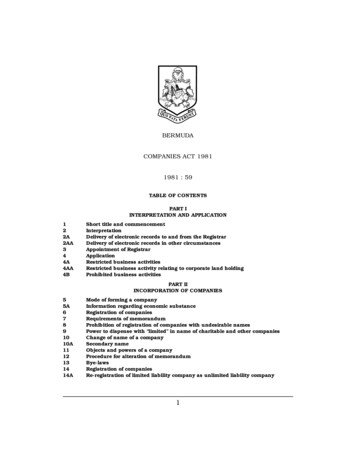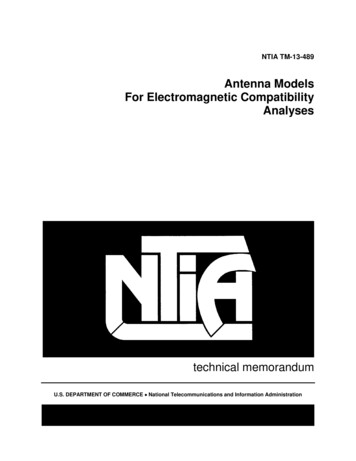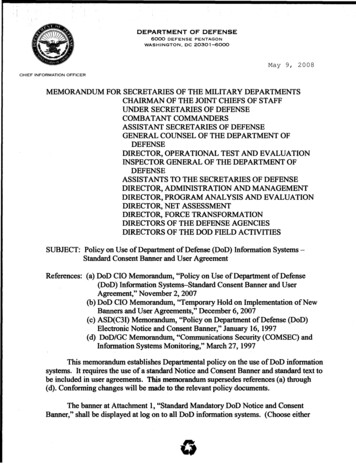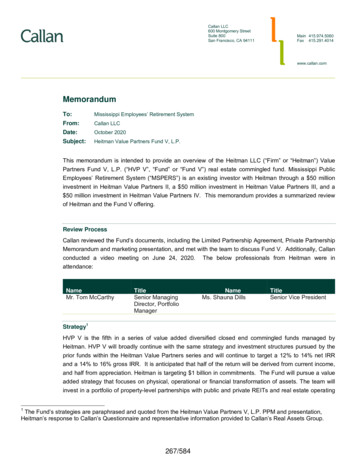
Transcription
MEMORANDUM OF UNDERSTANDINGRELATING TOTHE HANDLING AND TRANSPORT OF MATERIALSUSED OR RECOVERED DURING AN OIL SPILLBETWEEN THEDEPARTMENT OF FISH AND GAME’SOFFICE OF SPILL PREVENTION AND RESPONSEANDTHE DEPARTMENT OF TOXIC SUBSTANCES CONTROLWHEREAS, The Administrator of the Office of Spill Prevention and Responsewithin the Department of Fish and Game (hereinafter referred to as OSPR) and theDirector of the Department of Toxic Substances Control (hereinafter referred to asDTSC) are interested in developing a preapproved process for the handling andtransport of materials used or recovered during an oil spill response, including materialsthat may be classified as hazardous waste; andWHEREAS, Both the Administrator of OSPR and the Director of DTSC share thesame goal of minimizing any unnecessary deleterious impacts to the environment, or tothe public health and safety; andWHEREAS, The Administrator of OSPR has the primary authority to directprevention, removal, abatement, response, containment, and cleanup efforts with regardto all aspects of any oil spill in the marine waters of the State; andWHEREAS, The Director of DTSC has the primary authority for regulating thehandling, transport, recycling, treatment, and disposal of all hazardous waste within theState; andWHEREAS, Both the Administrator of OSPR and the Director of DTSC arerequired under State law to establish a process for the handling and transport ofmaterials used or recovered during an oil spill response.NOW, THEREFORE, the Administrator of OSPR and the Director of DTSC (theParties) have reached the following Memorandum of Understanding (MOU) andclarification of existing law concerning the handling and transport of materials used,collected, or recovered during an oil spill response.I.DefinitionsThe Parties agree that for the purposes of this MOU the following definitions willapply:a.Emergency Permit“Emergency permit” means a permit issued by the DTSC in accordancewith Title 22, California Code of Regulations, Section 66270.61.b.Federal On Scene CoordinatorSF691 001275 0293SGPPAppx VIII MOU.doc - 4/10/2006 10:41 PM51
“Federal On Scene Coordinator” means the federal designatedrepresentative from the U.S. Coast Guard or the U.S. EnvironmentalProtection Agency who represents the federal government within theUnified Command.c.Immediate Response“Immediate response” means the time period when response activitiesare undertaken that are reasonably necessary to prevent, reduce, ormitigate damages to persons, property, or natural resources of this Statedue to a threatened or actual spill of oil and/or oily materials.d.Incident action plan“Incident action plan” means the document(s) that describe thoseresponse activities approved by the Incident Commander or UnifiedCommand.e.Incident Commander“Incident Commander” means the state designated representative forcoordinating response to oil spills. The Administrator of OSPR or his orher designee is the Incident Commander during a spill and represents thestate within the Unified Command.f.Oil and/or oily materials“Oil and/or oily materials” means any substance, matter, or mediumcontaining or permeated with any kind of petroleum, liquid hydrocarbons,or petroleum products or any fraction or residues therefrom, including, butnot limited to, crude oil, bunker fuel, gasoline, diesel fuel, aviation fuel, oilsludge, oil refuse, oily water, oil mixed with waste, and liquid distillatesfrom unprocessed natural gas.g.Orphan spill“Orphan spill” means a situation where a Responsible Party does notexist, is unknown, or the Responsible Party is unable or unwilling toprovide adequate and timely cleanup and/or to pay for the damagesresulting from the spill.h.Response Activities“Response activities” means those activities that render care, assistance,or advice in accordance with the National Contingency Plan (40 CFR 300et seq.), the State Oil Spill Contingency Plan, or at the direction of theIncident Commander or Unified Command during an immediate responseto a spill or threatened spill of oil and/or oily materials. Responseactivities are approved in the incident action plan and include for thepurposes of this MOU, but are not limited to, separation, recovery,SF691 001275 0293SGPPAppx VIII MOU.doc - 4/10/2006 10:41 PM52
containment, transfer, or transport of oil and/or oily materials to temporarystorage sites.i.Response Areaj.“Response area” means the area where response activities are occurringor will be occurring as designated and approved by the IncidentCommander or Unified Command within the incident action plan.Response area may include, but is not limited to, the location(s) oftemporary storage sites and areas associated with a response vessels orother vehicle routes to such sites.Response personnel“Response personnel” are those individuals or entities performingresponse activities. Response personnel includes, but is not limited to, allemployees, agents, designees, or subcontractors of the ResponsibleParty, including oil spill cleanup organizations as well as local, state orfederal agency employees, volunteer workers, or individuals or entitiesacting under the direction of the Incident Commander or the UnifiedCommand.k.Responsible PartyFor the purposes of this MOU, “Responsible Party” means any of thefollowing:(1)The owner or transporter of oil and/or oily materials or a person orentity accepting responsibility for the oil and/or oily materials; or(2)The owner, operator, or lessee of, or person who charters bydemise, any vessel or marine facility; or(3)A person or entity who, as a shore-based representative of avessel or facility owner or operator, has full written authority toimplement an oil spill contingency plan or otherwise acceptsresponsibility for the vessel or marine facility.To the extent permitted by law, oil spill response organizations are notconsidered a Responsible Party solely due to their performance ofresponse activities authorized in this MOU.l.Spill or discharge“Spill” or “discharge” means any release of oil and/or oily materials into orany federal, state, or local government entity does not authorize thatimpacts state waters that.m.Temporary Storage Site“Temporary storage site” means an area or facility approved by theIncident Commander or Unified Command for characterizing andSF691 001275 0293SGPPAppx VIII MOU.doc - 4/10/2006 10:41 PM53
temporarily storing recovered oil and/or oily materials used, collected, orrecovered during an oil spill response. Such an area may include, but isnot limited to, permitted or interim status hazardous waste storagefacilities, other non-permitted facilities, vessels, barges, tanks, barrels,containers, storage piles, or other appropriate containment methods andlocations that may be used to hold recovered oil and/or oily materials.Temporary storage sites need not be owned, operated, or leased by aResponsible Party.n.Unified Command“Unified Command” consists of the state Incident Commander, theFederal On Scene Coordinator and the Responsible Party. The UnifiedCommand determines the procedures for directing personnel, facilities,equipment, and communications during the response, containment, andcleanup of an oil spill.II.ImplementationThe Parties agree that:III.a.The Director of DTSC will designate individual(s) (hereinafter DTSCrepresentative(s)) in advance or when notified by OSPR, the Office ofEmergency Services, or the U.S. Coast Guard that a threatened or actualspill or discharge of oil and/or oily materials has occurred who areauthorized to implement and ensure compliance with all terms andconditions of this MOU.b.The DTSC representative(s) will immediately report to the IncidentCommander or Unified Command for assignment where needed andrepresent the DTSC throughout the response, containment, and cleanupof the spill.c.The DTSC representative(s) will ensure that all appropriate federal, state,and local agencies are kept informed of potential or actual hazardouswaste issues throughout the response and related disposal activities.d.The Administrator of OSPR agrees to take appropriate efforts to ensurethat a Responsible Party reimburses DTSC for all reasonable andnecessary response costs incurred and to fund the positions of allreasonably necessary DTSC personnel throughout the duration of anorphan spill.Immediate Response ExemptionThe Parties agree that:a.During an immediate response, all response activities conducted on waterwithin the response area will be exempt from obtaining a hazardouswaste facility permit pursuant to section 66270.1(c)(3)(A), Title 22,SF691 001275 0293SGPPAppx VIII MOU.doc - 4/10/2006 10:41 PM54
California Code of Regulations, Division 4.5,and 66263 (hazardous wastemanifesting)for treatment or containment activities.IV .b.Response personnel will use the generator identification number issuedfor emergency response actions. However, other than the ResponsibleParty, owners and operators of response equipment, including but notlimited to, tanker vessels, barges, or other waterborne craft, vacuumtrucks, or other vehicles performing response activities shall not bedeemed hazardous waste generators for the purposes of this MOU andshall not require generator identification numbers.c.During an immediate response all oil and/or oily materials used, collected,or recovered within the response area will be allowed to be expeditiouslyremoved, transferred, or transported to temporary storage sites withoutuniform hazardous waste manifests.d.The immediate response exemption created in Article III shall be in effectat all times, for a period of up to thirty (30) days, while oil and/or oilymaterials are being recovered, transported, or transferred to temporarystorage sites for material characterization. Additional thirty (30) dayextensions may be granted under appropriate circumstances.Temporary Storage SitesThe Parties agree that:a.As soon as practicable once an immediate response has commenced,the Incident Commander or Unified Command will designate or approvetemporary storage sites for storing all oil and/or oily materials used,collected, or recovered during a spill response.b.The Incident Commander will notify DTSC of all designated or approvedtemporary storage sites, and, to the extent practicable and feasible, willwork in conjunction with the DTSC representative(s) and other state andlocal agencies to avoid any unnecessary deleterious impacts to theenvironment or threats to the public health and safety when designatingor approving temporary storage sites.c.The Incident Commander will ensure that DTSC representatives have fullaccess to all temporary storage sites to perform all appropriate regulatoryactivities.d.Permitted or interim status hazardous waste facilities, or other authorizedfacilities will obtain an emergency permit from DTSC to modify ornecessitate modifying any existing permits issued by DTSC for acting asa temporary storage site. The Responsible Party will be liable for all costsassociated with the emergency permit.e.Oil and/or oily materials stored or otherwise contained at temporarystorage sites may not be transferred, transported, treated, disposed,processed, used or re-used, or otherwise utilized until the IncidentSF691 001275 0293SGPPAppx VIII MOU.doc - 4/10/2006 10:41 PM55
Commander or Unified Command authorizes such activities.Authorization will not be given until such materials have beencharacterized (as described in Article V.), and a volumetric determinationof the amount of such materials recovered has been made or approvedby the Incident Commander.V.Material CharacterizationThe Parties agree that:a.Once the oil and/or oily materials have been contained at the temporarystorage site, the Responsible Party, or, in the event of an orphan spill, theIncident Commander in conjunction with DTSC, must expeditiouslydetermine:(1)Those materials that are capable of being processed, used or reused, or otherwise utilized as an ingredient in the manufacture ofpetroleum products or other products and therefore not a waste orhazardous waste; or(2)Those materials that are waste but are nonhazardous waste; or(3)Those materials that are hazardous waste.b.Materials capable of being processed, used or re-used, or otherwiseutilized as an ingredient in the manufacture of petroleum products orother products will be expeditiously transported to any facility that isotherwise authorized during non-spills to perform such activities.Facilities performing such activities will obtain emergency permits fromDTSC before processing, using or re-using, or utilizing such materials.The Responsible Party will be liable for all costs associated with theemergency permit.c.Recovered oil and/or oily materials deemed a waste by the ResponsibleParty, or by DTSC, must undergo chemical waste characterization asprovided in Title 22, California Code of Regulations, sections 66264.13and 66265.13, to determine whether the materials recovered arehazardous waste.d.Materials characterized as hazardous waste after undergoingcharacterization will be managed in accordance with all applicablestatutes, regulations, or permits prior to and during transfer, or transportto a hazardous waste management facility.e.Notwithstanding V.(a)-(d) or any other provision of law, debris that iscontaminated only with petroleum or any of its fractions is exempt fromregulation under Chapter 6.5, of Division 20 of the Health and SafetyCode if all of the following conditions are met:SF691 001275 0293SGPPAppx VIII MOU.doc - 4/10/2006 10:41 PM56
VI.(1)The debris consists exclusively of wood, paper, textile materials,concrete rubble, metallic objects, or other solid manufacturedobjects.(2)The debris is not subject to regulation as a hazardous wasteunder the federal act.(3)The debris does not contain any free liquids, as determined by thepaint filter test specified in the regulations adopted by thedepartment.(4)The debris is disposed of in a composite lined portion of a wastemanagement unit which is classified as either a Class I or Class IIlandfill in accordance with Article 3 (commencing with Section2530) of Chapter 15 of Division 3 of Title 23 of the California Codeof Regulations, the disposal is made in accordance with theapplicable requirements of the California regional water qualitycontrol board and the California Integrated Waste ManagementBoard, and, if the waste management unit is a Class II landfill, it issited, designed, constructed, and operated in accordance with theminimum standards applicable on or after October 9, 1993, to newor expanded municipal solid waste landfills, which are contained inPart 258 (commencing with Section 258.1) of Subchapter I ofChapter 1 of Title 40 of the Code of Federal Regulations, as thoseregulations read on January 1, 1996.Emergency PermitThe Parties agree that:a.b.Once oil and/or oily materials have been deemed hazardous waste at thetemporary storage site(s), the DTSC representative will expeditiouslydetermine if the storage of such materials creates an imminent andsubstantial endangerment to human health or the environment.If such determination is made, the DTSC representative will immediatelyissue an emergency permit to the Responsible Party, or to the IncidentCommander in the event of an orphan spill, for the temporary storagesite(s).c.The emergency permit will thereafter be valid throughout the duration ofthe response activities but in no case in excess of ninety (90) days unlessextended in writing by DTSC pursuant to Title 22, California Code ofRegulations, Section 66270.61.d.The emergency permit shall allow all response personnel to expeditiouslyperform all other response activities (within the scope of DTSC’sauthority) that are reasonably necessary to prevent, reduce, or mitigatedamages to persons, property, or natural resources of this State includingtransfer, treatment, storage, resource recovery, or disposal of materialsused, collected, or recovered during the oil spill response.SF691 001275 0293SGPPAppx VIII MOU.doc - 4/10/2006 10:41 PM57
VII.MiscellaneousThe Parties agree that:a.The terms of this MOU may be changed at any time by the mutualconsent of both Parties by a written, signed amendment hereto.b.In the event that individual and severable portions of this MOU are foundto be in conflict with either State or Federal law, regulations or policies,and, therefore, of no effect, the MOU will remain in effect without thoseprovisions unless either party notifies the other in writing that the entireMOU is terminated.c.Any action to modify, amend, or terminate this MOU may only be taken bythe Administrator of OSPR and the Director of DTSC, or persons to whomthis authority is specifically delegated by them.FOR THE OFFICE OF OIL SPILLDEPARTMENT OFPREVENTION AND RESPONSE:CONTROL:FOR THETOXIC SUBSTANCESPete BontadelliAdministratorFOR THE DEPARTMENT OF FISHAND GAME:SF691 001275 0293SGPPAppx VIII MOU.doc - 4/10/2006 10:41 PM58Jesse HuffDirector
materials used or recovered during an oil spill response. NOW, THEREFORE, the Administrator of OSPR and the Director of DTSC (the Parties) have reached the following Memorandum of Understanding (MOU) and clarification of existing law concerning the handling and transport of materials used, collected, or recovered during an oil spill response.
